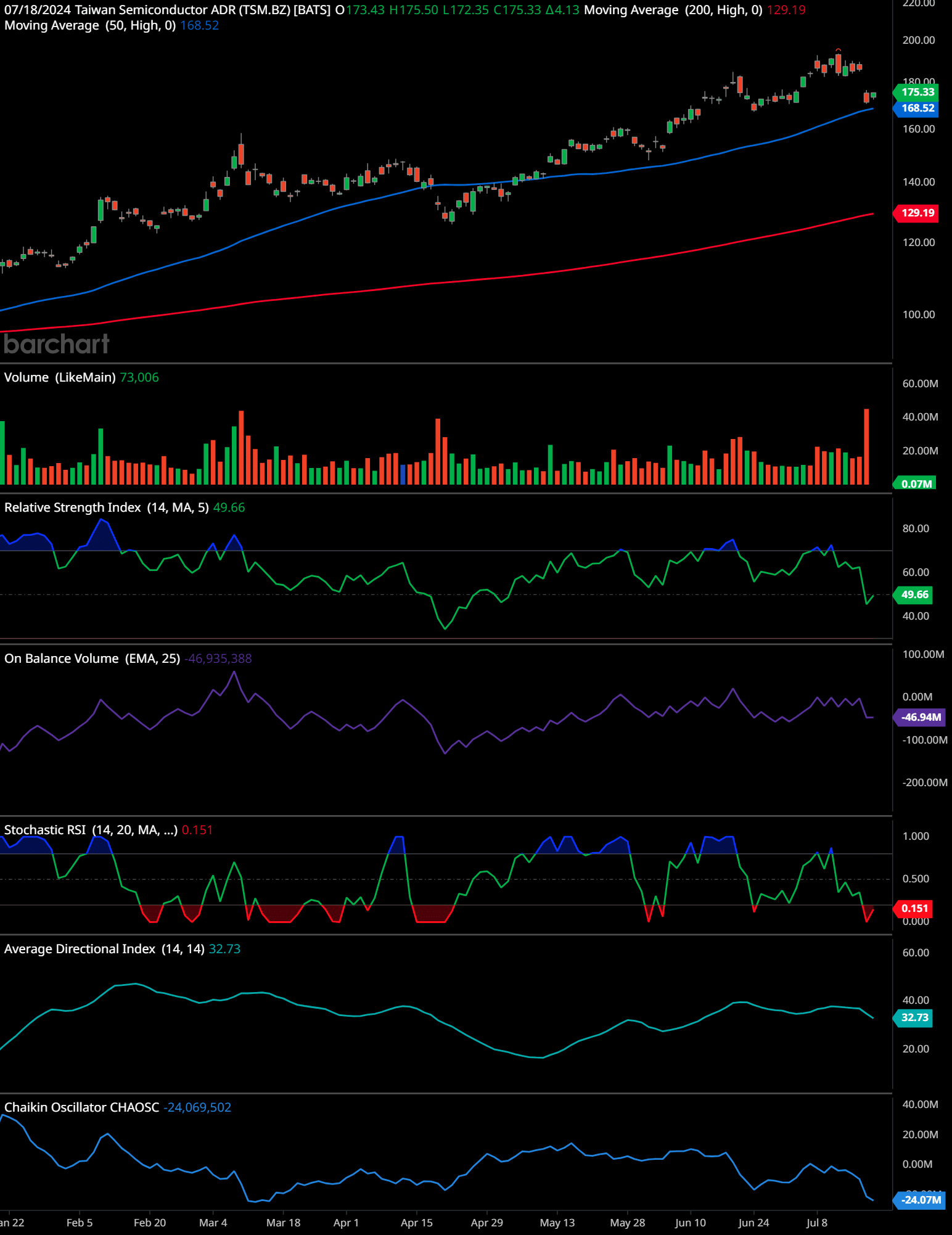On July 17, 2024, Taiwan Semiconductor Manufacturing Company (TSM) stock dropped more than 7% due to several geopolitical factors and potential trade restrictions. The Biden administration was reportedly considering stricter export controls on semiconductor technology to China, a significant market for TSMC. Former U.S. President Donald Trump’s comments that Taiwan should pay the U.S. for its defense added to concerns about U.S. commitment to Taiwan. The broader semiconductor sector also saw a significant downturn, with the Philadelphia Semiconductor Index experiencing its worst single-day performance since 2020. Ongoing U.S.-China tensions and a market shift away from large-cap technology stocks further contributed to the decline, reflecting investor concerns about TSMC’s future amidst these uncertainties.
Potential Tighter Export Controls
One of the primary factors behind TSMC’s stock decline was the potential for tighter export controls from the Biden administration. Reports suggested that the U.S. government was considering implementing stricter export controls on semiconductor technology to China. Given that China represents a substantial portion of TSMC’s sales, such restrictions could severely impact the company’s revenue and growth prospects. Investors reacted negatively to the news, fearing that reduced access to the Chinese market could hinder TSMC’s dominant position in the global semiconductor industry.
Trump’s Comments on Taiwan
Further exacerbating the situation were remarks made by former U.S. president and current Republican presidential candidate Donald Trump. Trump suggested that Taiwan should compensate the United States for its defense, claiming that “Taiwan doesn’t give us anything.” These comments raised concerns about the U.S. commitment to Taiwan’s defense, which is crucial for TSMC’s operations. The uncertainty surrounding U.S. foreign policy towards Taiwan added to the negative sentiment, as investors worried about the potential implications for TSMC in the face of geopolitical instability.
Broader Semiconductor Industry Decline
The entire semiconductor sector also faced a significant downturn on July 17. The Philadelphia Semiconductor Index, a benchmark for the industry, recorded its worst single-day performance since 2020. This broader decline in the semiconductor market put additional pressure on TSMC’s stock. Investors appeared to be reacting to a combination of industry-specific challenges, including supply chain disruptions, fluctuating demand, and the ongoing technological arms race between the U.S. and China.
U.S.-China Tensions
Ongoing geopolitical tensions between the United States and China have created a climate of uncertainty for the semiconductor industry. Companies like TSMC, which have significant exposure to both markets, are particularly vulnerable. The escalating trade war, coupled with the potential for new regulatory measures, has made it increasingly difficult for semiconductor firms to navigate these geopolitical challenges. TSMC’s stock price decline reflected investor apprehensions about the future stability of U.S.-China relations and their impact on the company’s operations.
Market Shift Towards Small-Cap Stocks
In addition to these specific factors, there was a broader market trend of investors shifting away from large-cap technology stocks, including semiconductor companies, in favor of small-cap stocks. This shift was driven by a search for potentially higher returns and a desire to diversify portfolios amid increasing market volatility. The movement away from large-cap tech stocks further contributed to the pressure on TSMC’s stock price, as investors reallocated their assets to different sectors.
Insights:
- Stricter export controls to China could severely impact TSMC’s revenue.
- Trump’s comments heightened worries about U.S. defense support for Taiwan.
- The semiconductor sector suffered broadly, indicating widespread industry challenges.
- U.S.-China tensions continue to create market instability for TSMC.
- Investors are shifting focus from large-cap technology stocks to small-cap stocks.
The Essence (80/20)The Origins and Evolution of the 80/20 Principle The Discovery by Vilfredo Pareto In 1897, Italian economist Vilfredo Pareto uncovered a striking pattern in his study of wealth and... More:
- Geopolitical Impact: Geopolitical tensions, specifically between the U.S. and China, are significantly impacting TSMC’s operations and stock performance.
- Policy Changes: Potential stricter export controls by the U.S. on semiconductor technology to China pose a substantial risk to TSMC’s business.
- Market Sentiment: Negative market sentiment driven by high-profile political comments and a broader downturn in the semiconductor sector.
- Investor Behavior: A notable shift in investor behavior away from large-cap tech stocks to small-cap stocks, affecting TSMC’s stock value.
The Action Plan – What TSMC Will Likely Do Next:
- Diversify Markets: TSMC should seek to diversify its markets to reduce dependency on China.
- Engage with Policymakers: Actively engage with U.S. policymakers to understand and mitigate the impact of potential export controls.
- Investor Communication: Enhance communication with investors to manage sentiment and provide clarity on strategic responses to geopolitical issues.
- Strengthen Alliances: Reinforce partnerships and alliances with other countries to ensure stable market access.
Blind Spot: Potential impacts on TSMC’s supply chain logistics due to geopolitical tensions and export controls might be underestimated, which could further affect production and distribution timelines.
TSM Technical Analysis

The chart for Taiwan Semiconductor ADR (TSM) shows several key technical indicators that can help us analyze the stock’s performance and make informed investment decisions.
Major Trends:
The stock has been in an upward trend, as indicated by the price movement above the 50-day moving average (168.52) and the 200-day moving average (129.19). This is a positive sign showing a general bullish trend over the observed period.
Volume:
There was a significant volume spike, which could indicate strong buying or selling interest. Volume spikes often precede major price movements, so this is an important point to watch.
Relative Strength IndexIn the world of technical analysis, the Relative Strength Index (RSI) stands as a cornerstone tool for traders seeking insights into market momentum. Developed by J. Welles Wilder ... More (RSI):
The RSI is currently at 49.66, which is in the neutral range. An RSI above 70 is typically considered overbought, and below 30 is considered oversold. The current neutral position suggests neither strong buying nor selling pressure.
On-Balance VolumeThe On Balance Volume indicator (OBV) is a technical analysis tool used to measure the flow of money into and out of a security over a specified period of time. It is a cumulative ... More (OBV):
The OBV is at -46,935,388, showing a bearish divergence as it trends downward while the price has been rising. This could indicate that the upward trend might not be strongly supported by volume.
Stochastic RSIIn the realm of technical analysis, the Stochastic RSI (StochRSI) emerges as a powerful tool for traders seeking to navigate market dynamics with precision. Developed by Tushar S. ... More:
The Stochastic RSI is at 0.151, indicating an oversold condition. This could suggest a potential buying opportunity if other indicators confirm.
Average Directional IndexThe Average Directional Index (ADX) stands as a cornerstone indicator in the toolkit of technical traders, offering insights into the strength of market trends. Developed by Welles... More (ADX):
The ADX is at 32.73, indicating a strong trend. Generally, an ADX above 25 suggests a strong trend, whether it be up or down.
Chaikin OscillatorNamed after its creator Marc Chaikin, the Chaikin Oscillator stands as a formidable tool in the arsenal of technical analysts. This oscillator is designed to measure the accumulati... More:
The Chaikin Oscillator is at -24,069,502, indicating selling pressure. This oscillator helps in identifying trends in accumulation/distribution.
Support and Resistance Levels:
- Support: Around the 50-day moving average at 168.52.
- Resistance: Around the recent high of 175.50.
Time-Frame Signals:
- 3-Month Horizon: Hold – The stock shows a neutral RSI and significant volume, indicating potential consolidation.
- 6-Month Horizon: Buy – The overall upward trend and moving averages support a bullish outlook.
- 12-Month Horizon: Buy – The long-term trend remains positive, with strong moving average support.
Past performance is not an indication of future results. This analysis should not be considered as investment advice. Always conduct your own research and consider consulting with a financial advisor before making any investment decisions. 🧡
Looking Ahead
The sharp decline in TSMC’s stock price on July 17, 2024, was the result of a confluence of factors. Potential tighter export controls from the U.S. threatened a significant portion of TSMC’s market, while Trump’s comments on Taiwan raised doubts about the stability of U.S.-Taiwan relations. The broader decline in the semiconductor industry, ongoing U.S.-China tensions, and a market shift towards small-cap stocks added to the negative sentiment. As TSMC navigates these geopolitical and market challenges, investors remain cautious about the company’s future prospects in an increasingly uncertain global landscape.
Frequently Asked Questions about TSMC Stock Drop
1. Why did TSMC’s stock drop more than 7% on July 17, 2024?
The stock dropped due to a combination of geopolitical factors and potential trade restrictions, including tighter export controls, comments from Donald Trump, a broader semiconductor industry decline, U.S.-China tensions, and a market shift away from large-cap technology stocks.
2. What potential tighter export controls are affecting TSMC?
The Biden administration was reportedly considering stricter export controls on semiconductor technology to China, which could significantly impact TSMC as China accounted for a substantial portion of its sales.
3. How did Donald Trump’s comments on Taiwan impact TSMC’s stock?
Donald Trump suggested that Taiwan should pay the U.S. for its defense, raising concerns about the U.S. commitment to Taiwan’s defense and adding to the negative sentiment surrounding TSMC’s stock.
4. How did the broader semiconductor industry perform on July 17, 2024?
The entire semiconductor sector experienced a significant downturn, with the Philadelphia Semiconductor Index posting its worst single-day performance since 2020.
5. What role did U.S.-China tensions play in TSMC’s stock decline?
Ongoing geopolitical tensions between the United States and China created uncertainty in the semiconductor industry, particularly for companies like TSMC that have significant exposure to both markets.
6. What was the market trend that affected TSMC’s stock price?
There was a broader trend of investors moving away from large-cap technology stocks, including semiconductor companies, towards small-cap stocks.
7. How significant is China to TSMC’s sales?
China accounts for a substantial portion of TSMC’s sales, making potential export controls particularly impactful.
8. What concerns were raised by Donald Trump’s comments on Taiwan?
His comments raised concerns about the U.S. commitment to Taiwan’s defense, contributing to investor anxiety regarding TSMC’s future.
9. How often has the Philadelphia Semiconductor Index seen similar declines?
The decline on July 17, 2024, was the worst single-day performance for the Philadelphia Semiconductor Index since 2020.
10. What are the broader implications of U.S.-China tensions for semiconductor companies?
U.S.-China tensions create significant uncertainty for semiconductor companies, especially those with exposure to both markets, impacting their stock performance and future prospects.
💥 GET OUR LATEST CONTENT IN YOUR RSS FEED READER
We are entirely supported by readers like you. Thank you.🧡
This content is provided for informational purposes only and does not constitute financial, investment, tax or legal advice or a recommendation to buy any security or other financial asset. The content is general in nature and does not reflect any individual’s unique personal circumstances. The above content might not be suitable for your particular circumstances. Before making any financial decisions, you should strongly consider seeking advice from your own financial or investment advisor.










